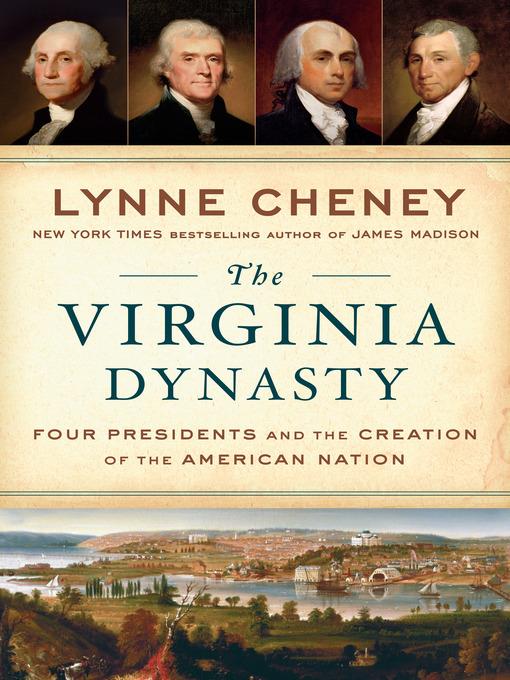
The Virginia Dynasty
Four Presidents and the Creation of the American Nation
کتاب های مرتبط
- اطلاعات
- نقد و بررسی
- دیدگاه کاربران
نقد و بررسی

July 13, 2020
Historian Cheney (James Madison: A Life Reconsidered) delivers an accessible group portrait of George Washington, Thomas Jefferson, James Madison, and James Monroe. Noting that all four were born, raised, and made their homes within a 60-mile radius in Virginia, Cheney contends that they formed “a dynasty whose members led in securing independence, creating the Constitution, and building the Republic.” She attributes her subjects’ political success to their gifts of leadership and judgment, as well as to their coming of age during a “transformative time” when it was possible to imagine a society organized by Enlightenment ideals. Virginia’s unique political, cultural, and geographic make-up also played a key role, according to Cheney, who notes that her subjects, like other “talented” members of Virginia’s gentry class, entered the colonial legislature at a young age, and understood Virginia’s outsize influence over American politics. Charting the dynasty’s evolving dynamics, Cheney sketches the Revolutionary War careers of Washington and Monroe; details internal disagreements over the Constitution, federalism, and foreign policy; and describes group efforts to “clear the way for the next Virginian in line” to the presidency. Though readers well-versed in the era won’t learn much new, Cheney selects anecdotes wisely and writes gracefully. The result is an informative introduction to four of America’s most important founding fathers.

September 1, 2020
An edifying introduction to the lives of four presidents of the U.S. On Christmas night in 1776, George Washington and his Continental Army scored a much-needed victory over Hessian mercenaries, a triumph captured by German American artist Emanuel Leutze in his 1851 painting, Washington Crossing the Delaware. It depicts 12 men in Washington's boat, including an 18-year-old lieutenant named James Monroe. This dramatic moment, suggests Cheney, foreshadowed the "Virginia Dynasty" (1789-1825), during which four of the first five presidents of the U.S. hailed from the Old Dominion. According to the author, the four men--Washington, Thomas Jefferson, James Madison, and Monroe--who composed the Dynasty were all "children of the Enlightenment" who valued individual rights as well as slaveholders who "sensed the coming of a great conflict" over that wicked institution and thus "feared for the Union." Yet they were different. Washington was the prototypical leader, Jefferson and Madison the "life-long students" and wordsmiths, and Monroe the diligent type who lacked the "intellectual agility" of his two immediate predecessors in office. At times they clashed: Madison and Monroe ran against each other in a congressional election, and Jefferson, Madison, and Monroe opposed the policies of Alexander Hamilton, Washington's first secretary of the treasury. Cheney capably shows that despite these differences and disputes, the quartet helped lead to "the creation of the American nation," and general readers will learn plenty from the text. However, the author breaks no new ground for those already familiar with the history of her principals, and her account suffers from supposition (too many instances of the phrase "may have"; "Jefferson and Madison surely took up the topic" of their health when they roomed together; "Madison, an uncommonly serious student, might have earlier been acquainted with such ideas") and odd repetition ("at age twenty-nine, less than three months after his arrest, [Benjamin Franklin Bache] died of yellow fever at age twenty-nine"). A flawed yet informative history of the early years of the Republic.
COPYRIGHT(2020) Kirkus Reviews, ALL RIGHTS RESERVED.

September 4, 2020
As Cheney (James Madison) reminds readers, Virginians and Founding Fathers--George Washington, Thomas Jefferson, James Madison, and James Monroe--were four of the first five presidents of the United States, presiding for 32 of the nation's first 36 years. It wasn't a lockstep progression, however. Washington was a Federalist even before the nation had political parties; Jefferson, Madison, and Monroe were Republicans, their positions defined in opposition to Federalist goals. Nor did the four, or any two among them, always get along, although the tensions were set aside once all were out of office. The realities of governing a new country led the three Republicans to reverse positions on key issues at times: Jefferson achieved the Louisiana Purchase, Madison supported reestablishment of a national bank after the War of 1812, and Monroe purchased Florida. Cheney effectively describes how, in these instances, purity of position proved less important than advancing the nation's interests. VERDICT Bringing these men together as a group draws attention to how their thought and action unfolded in response to new challenges and dispels any illusion that they were a monolithic bloc. Cheney is an adept writer who makes no wrong steps. Perfect for history buffs, though little new ground is tread.--David Keymer, Cleveland
Copyright 2020 Library Journal, LLC Used with permission.

























دیدگاه کاربران